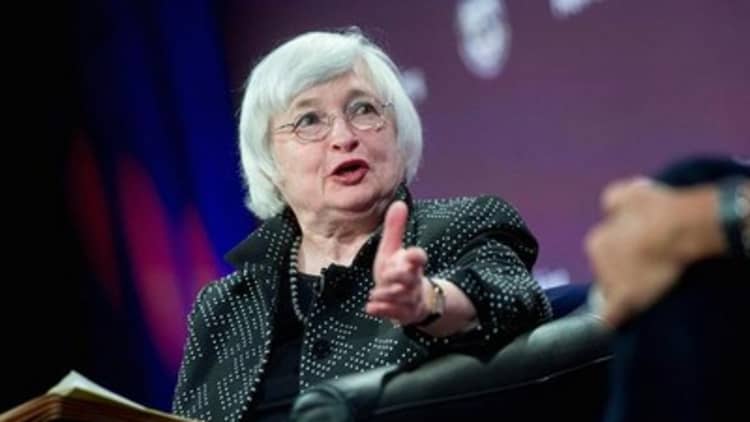
The headline jobs and employment numbers may look good, but the underlying details of the U.S. economy remain weak, Michael Tyler, chief investment officer of Eastern Bank Wealth Management, said Thursday.
While U.S. markets have charged higher recently, the United States is adding too many low-skilled, low-wage jobs and people who do become unemployed are still sitting on the sidelines for too long, he said.
"The economy is not completely fixed yet, but I think that it is somewhat midcycle, although the market may be farther along than that," Tyler told CNBC's "Squawk Box."
But that does not necessarily mean investors should pull their money out of U.S. equities, Tyler added.
Read More Get 'overweight' on this sector: Trader
"There is nothing wrong with the U.S. stock market right now, so yes, stay in the U.S.," he said. "But having said that, I think there may be more opportunities outside the U.S. where the monetary authorities are finally beginning to do the things the Fed did several years ago, and that is helping a global reflation, it is helping European, Japanese and other economies finally get going."
Meanwhile, the Federal Reserve is in no hurry to raise interest rates because the macroeconomic data it is reviewing to determine whether the U.S. economy can weather a hike is still problematic, he said.
On Wednesday, the Fed released minutes from its April meeting, which showed central bankers were not prepared to raise interest rates in June. The Fed has held its benchmark interest rates near zero since December 2008.
"The Fed wants to see consistency in the economy, and so far they haven't," he said.
Tyler expects the economy to deliver that consistency soon. He sees second-quarter economic data coming in "surprisingly strong" as the United States moves past first-quarter West Coast port disruptions. He also forecasts greater stability in the third and fourth quarters.
Read More Beware of bond bubble forming in ETFs
With unemployment at 5.4 percent, the U.S. economy is approaching the point at which inflation will begin to rise, said Jurrien Timmer, director of global macro at Fidelity Investment Services.
In addition to low, stable unemployment levels, the Federal Reserve would like to see inflation rise toward 2 percent as it determines the path of interest rate increases.
"We're inching along to the point where the Fed has to start looking at the inflation component of the employment sector, and if we start really growing by leaps and bounds, that's great, but it also brings us closer to the end point," Timmer told "Squawk Box," referring to the end of the growth cycle.
He continued to say, "We want growth, but we don't want overheating, because historically that's how the cycle ends."


